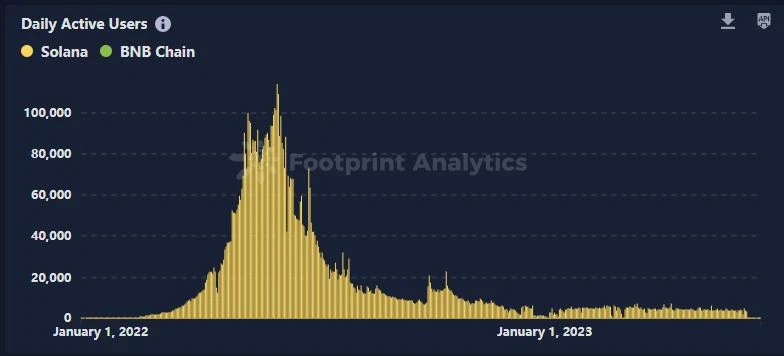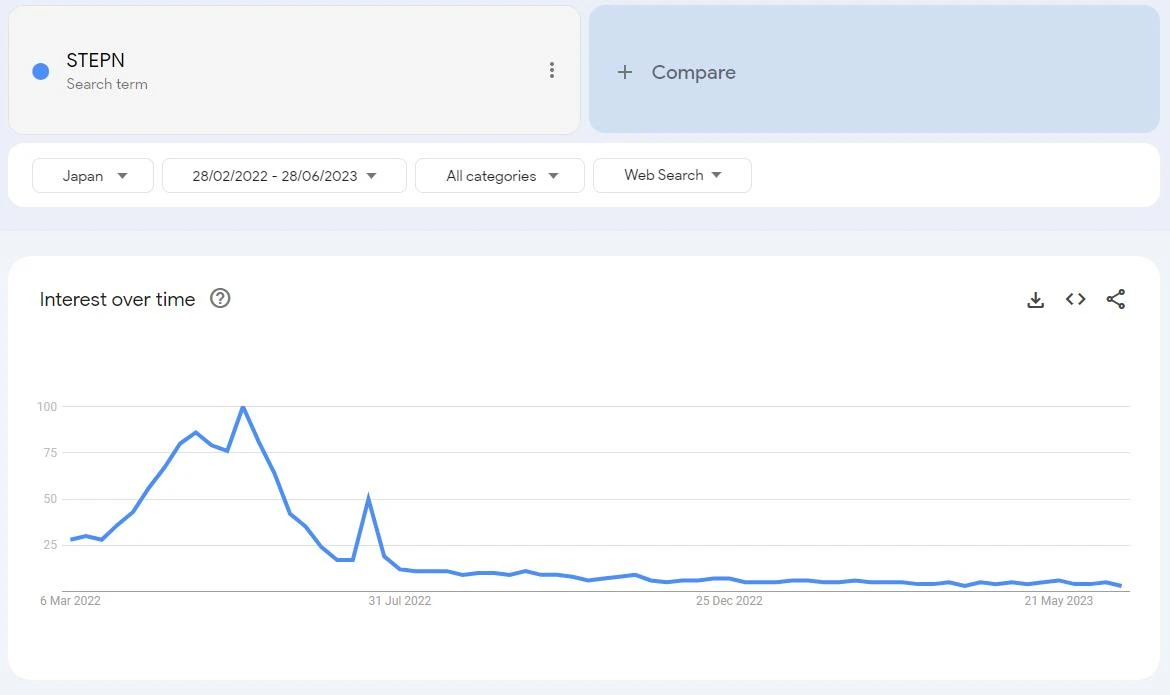In the cryptocurrency industry in Japan, two areas, NFTs and Web 3 games, dominate. High-quality projects have adopted a series of operational strategies, including building strong communities, localized marketing, and winning users' trust through long-term operation. In recent months, the relaxation of Japanese regulations has attracted more attention to the field of cryptocurrency.
Key Points:
To ensure market stability and investor asset security, the Japanese government has established strict laws and regulations, which pose a challenge for small-scale cryptocurrency projects.
STEPN is a successful example of a project that has entered the Japanese market. The project seized the opportunity, implemented localized marketing, actively built a community, and attracted a lot of attention in the Japanese market.
Globally, Japan is a unique market with tremendous potential in the financial and investment sectors, with a strong retail forex industry and a thriving stock trading sector.
Due to frequent hacker attacks on early cryptocurrencies, the Japanese government has maintained a conservative attitude towards the cryptocurrency industry and exercised cautious regulation. Even today, due to the supervision of the Financial Services Agency, the range of cryptocurrency asset choices in Japan is relatively limited.
However, in 2017, Japan approved Bitcoin as a legal form of payment, creating conditions for the rapid development of the cryptocurrency industry. Although the government was initially skeptical of the industry, recent events indicate that the government has become more supportive of its development as the blockchain industry in Japan continues to grow.
In April 2023, the Web 3.0 project team of Japan's ruling party released a white paper proposing measures to promote the development of the Japanese cryptocurrency industry. In June 2023, Japan's "Funds Settlement Act Amendment Bill" was passed by the Upper House, making it the first country in the world to enact stable coin legislation.
However, due to certain policy restrictions, such as the inability to directly invest in tokens or launch token projects, the development of DeFi in Japan remains relatively limited. Therefore, NFTs and blockchain games are generally considered the main participants in the Japanese cryptocurrency market.
If you want to learn more about the cryptocurrency market in Japan, you can click here to view the full report: Crypto in Japan: Industry Trends and Future Prospects Research
What are the characteristics of successful blockchain projects in Japan?
Japanese high-quality blockchain projects have adopted a series of operational strategies, including building a strong community, localizing the project, and winning the trust of users through long-term operation.
Strong Community
One of the most important characteristics of a successful blockchain project is having a community composed of project supporters and loyal users. This community can help the project increase its visibility, enhance participation, and ensure long-term operation. To achieve community prosperity, various methods can be employed, such as organizing community events, incentivizing users, and improving project transparency.
Localization of the Project
Localization operation of the project is crucial for various blockchain projects in the Japanese market. Due to Japan's strong cultural foundation and the dominance of the Japanese language in daily life, overseas projects need to adapt their products and services to local regulations, translate information into Japanese, and collaborate with local KOLs and media to hold local events. By engaging with localized audiences, the project can gain more visibility and users.
Long-Term Operation
A successful blockchain project must have the ability to withstand risks and adapt to the market. To develop a viable product and concept, it is necessary to maintain stable operation amidst market fluctuations. Japanese people are relatively cautious and generally skeptical of new technologies, so projects must gradually establish reputation and engage in long-term operation in the Japanese market to achieve success in the market.
In addition to these characteristics, establishing partnerships with local KOLs, VCs, projects, and media in Japan can also help projects expand their influence, build credibility, and drive win-win growth. This is especially important in Japan because industry giants, especially companies in traditional sectors, still dominate the market. Therefore, startups should fully leverage their innovative advantages to establish partnerships with these existing industry giants, thereby gaining momentum.
STEPN Case Study: Overseas Project's Development in the Japanese Market

STEPN is the first game to implement the "Move to Earn" economic model and achieve significant success in the cryptocurrency market in Japan.

The core game mechanism of STEPN is that players can purchase sports shoe NFTs and earn in-game tokens GST by walking, jogging, or outdoor running. These tokens can be used to upgrade existing sports shoes or create new ones. STEPN has achieved tremendous success in Japan, thanks to several key factors.
First, the timing of entry plays a crucial role. When STEPN was launched around the end of 2021, the macro market conditions were relatively favorable. After the bull market in November 2021, many people had ample funds. The increase in liquidity led to a willingness for users to make larger purchases of in-game items. Although the project itself cannot control the market trend, it is still an important decision factor for the project's success.
In addition, it is worth noting that Japanese players generally have higher spending power compared to players from other countries. They are often willing to invest significant amounts of money in NFT items in the game, and some even invest six-figure amounts in pursuit of maximizing game returns.
Compared to other countries, this level of expenditure is rare in the gaming field. For example, Axie Infinity is a popular game in the Philippines, and its main driving force comes from a scholarship mechanism. Players can rent three Axies to join a guild at a lower price, allowing individuals to participate with minimal initial capital.
From the early stages of the game's release, STEPN identified Japan as its target market. Therefore, before players from other parts of the world joined the game's economic system, Japanese players had already used their strong purchasing power to shape the market circulation mechanism within the game, resulting in a healthier level of market activity and liquidity than the global average. Japanese people tend to have lower global community participation, and STEPN successfully adapted to the local Japanese community, sparking a positive feedback loop, thus leading to more discussions about STEPN in the Japanese market compared to other major markets in the world.

Source: Google Trends
In the game, the use of GPS can also be seen as a favorable factor. STEPN needs to accurately track GPS to prevent cheating and maintain the integrity of the in-game economy, while also being able to inject bets in real time. Many Japanese people use iPhones with precise GPS systems, which allows players to easily start the game and make money.
The Gacha system is a unique feature widely used in Japanese mobile games, where players can use game tokens to exchange for random in-game items. The Gacha system has always been an important factor driving game growth in Web 2 mobile games. STEPN has successfully integrated this concept into the game, enhancing the engagement and interest of game players.
During the peak period of the game, STEPN players were able to earn approximately $3,000 a day just by walking. The user-friendliness of this game and the generous rewards sparked a viral frenzy, and even triggered a breaking-the-circle effect.
Other projects can learn strategies from successful cases like STEPN. However, it should be noted that macro market conditions and other external factors also have a significant impact on projects operating successfully in the Japanese market.
Opportunities and Challenges in the Japanese Cryptocurrency Industry
Japan has a strong and well-developed traditional financial system, providing a solid foundation for the development of its blockchain and Web 3 industries.
When it comes to Japan's cryptocurrency market, compliance has always been an important issue. In order to ensure market stability and investor asset security, Japan has strict laws and regulations in the blockchain field. However, while these regulations protect the industry, they also pose challenges for some nascent cryptocurrency projects. The high costs of compliance and high tax burdens have hindered the entry and development of these projects. In addition, the lengthy approval process for token listings has led to the perception that the market lacks vibrancy and has caused loss of confidence in this field.
For a long time, Japan has maintained a major focus on stability and prudence in financial affairs. This attitude may restrict corporate innovation and market flexibility, but at the same time, it protects traders from significant risks. Innovation is key to the success of cryptocurrencies, so the lack of innovation may be a significant reason why Japan's cryptocurrency industry lags behind other countries.
The good news is that in April 2023, the Web 3.0 project team of Japan's ruling party released a white paper proposing measures to promote the development of Japan's cryptocurrency industry. In June 2023, Japan's "Funds Settlement Act Amendment Bill" was passed by the upper house of parliament, making Japan the world's first country to enact stablecoin legislation.
Institutional investors in Japan have shown an increasingly strong interest in cryptocurrencies and have gained a clearer understanding of the potential of this industry. The growing market interest may greatly drive the development of the entire cryptocurrency industry, bringing more liquidity, stability, and credibility to the market, and thereby attracting more retail and institutional investors' interest.
The Japanese gaming market and its powerful IP resources have proven their enormous potential. The unique cultural characteristics of Japan combined with a strong financial system will make it a global leader with tremendous potential in the Web 3 industry. By leveraging its advantages, promoting innovation and growth, Japan has the opportunity to lead the future of the global Web 3 industry.
Footprint Analytics is a structured data platform that connects Web 2 and Web 3. With cutting-edge artificial intelligence technology, we provide the first no-code data analysis platform and unified data API in the crypto field, allowing users to quickly retrieve NFT, GameFi, and DeFi data from over 26 blockchain ecosystems.
Footprint Website: https://www.footprint.network
Discord: https://discord.gg/3HYaR6USM7
Twitter: https://twitter.com/Footprint_Data










